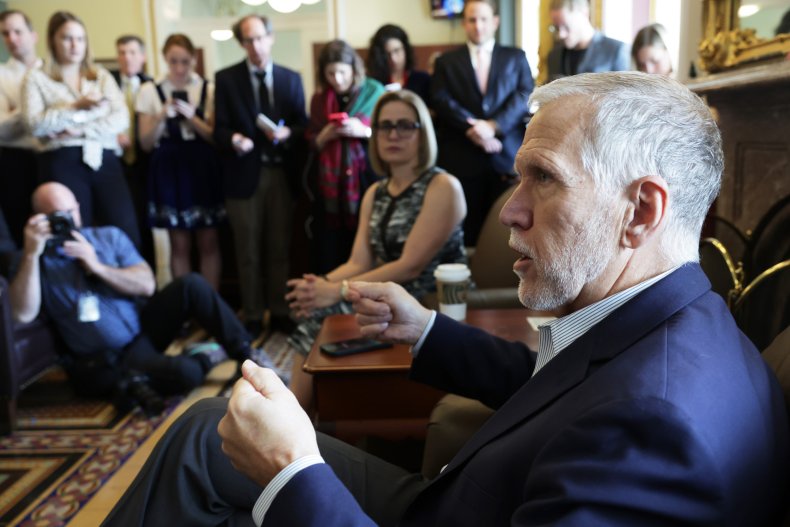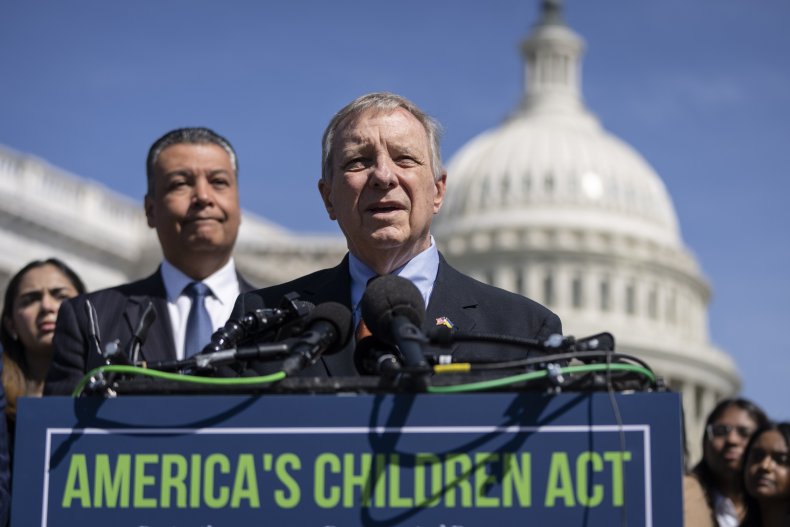Instead of a much-anticipated surge of migrants at the U.S.-Mexico border following the May 11 expiration of Title 42, border officials instead are reporting a drop in attempted crossings. However, lawmakers on Capitol Hill are only ramping up their efforts to get a border enforcement and immigration package on President Joe Biden’s desk.
“I think this is a recalibration time frame for the cartels, so it wouldn’t surprise me if a month or two months from now we’ll see a year over year increase,” Republican Senator Thom Tillis of North Carolina told Newsweek. “We’ve just got to do a better job of letting people know it’s growing in the wrong direction and that’s why we have to have border security.”
Implemented by the Trump administration upon the onset of the COVID-19 pandemic, the Title 42 public health authority has allowed the Biden administration to swiftly expel certain groups of migrants at the border “to prevent spread of communicable diseases.”
Troy Miller, the top official at U.S. Customs and Border Protection (CBP), originally predicted the border could see as many as 10,000 attempted crossings a day when Title 42 expired. But Homeland Security Secretary Alejandro Mayorkas said during an appearance on CNN on Sunday that authorities saw a “50-percent drop” in the days following the end of Title 42.
Doris Meissner, a senior fellow and director of the U.S. Immigration Policy Program at the Migration Policy Institute, explained that the Biden Administration took a number of steps in the months preceding Title 42’s expiration that appear to have paid off.
Photo by GUILLERMO ARIAS/AFP via Getty Images
She noted that in January the administration brought forth a series of “incentives and disincentives” for migrants to gain access to the U.S. asylum system. One of these rules promoted use of the CBP One app as a tool for individuals to schedule asylum appointments at Ports of Entry. If individuals do not seek asylum at appropriate Ports of Entry, they must show that they did not seek it another country prior to making their claim at the U.S. border.
In addition, the Biden Administration sent 1,500 active-duty troops to the border to relieve the workload placed on CBP. The U.S. also drew attention to regional processing centers in Central America to provide local support to individuals who qualify for asylum and to deter those who don’t from traveling north.
Tillis acknowledged the “positive” effects of the administration’s actions but stressed that they did not fix the problem. Meissner “agreed” with the North Carolina lawmaker’s assessment.
“We know that the conditions that are pushing people remain unchanged: the violence and the poverty and the poor governance and the corruption and the cartel activity,” Meissner told Newsweek. “There’s only so much that you can do through enforcement actions and through changing the rules in the way that the administration is trying to do. The administration has a very limited range of actions that it can take—Congress ultimately has to act.”
Meissner notes that while the administration has avoided a major surge, migration levels remain historically high. In April, CBP reported over 211,000 encounters with migrants at the southwest border, more than double the level seen at the onset of Biden’s presidency. She said that now can be a time for Congress to “take advantage” of the current lull and address the issue before the cartels have time to recalibrate.

Photo by Alex Wong/Getty Images
Tillis remains at work with Senator Kyrsten Sinema, an Arizona Independent, on drafting a comprehensive framework that would provide funding for the hiring of new CBP agents, enhance border enforcement technology, modernize the asylum system, address issues within the work visa process, and provide Dreamers—immigrants brought to the country illegally as young children—a path to citizenship.
In addition to this effort, Tillis and Sinema brought forth a bill that would effectively extend Title 42 for two years, a move that Tillis argues would provide the administration additional time to handle any potential migration surges. Republican Senator John Cornyn of Texas and Democratic Senator Joe Manchin of West Virginia signed onto this effort as co-sponsors.
“We didn’t see the immediate reaction [to Title 42], but what still remains true is an unprecedented number of illegal encounters last year and I think a greater number this year,” Tillis said. “Once the cartels figure out the exceptions and the exemptions [in the administration’s actions], I wonder how much the plain letter of the policy, which has to do with asylum, actually what effect it has.”
On May 11, House Republicans passed their own border agenda which would increase funding for border agents, resume construction of the border wall, upgrade border technology, introduce asylum restrictions, institute new requirements around the E-Verify employment verification database, and reinstate the Trump-era policy requiring certain asylums seekers to “Remain in Mexico” as their cases are heard.

Photo by Drew Angerer/Getty Images
Tillis said this “lays the groundwork” for discussions and said he supports a “majority” of the proposal. However, there is a chance his Democratic colleagues may preempt his collaboration with Sinema by passing a Senate response to the GOP measure.
Senator Dick Durbin of Illinois, the second highest-ranking Democrat, and Gary Peters of Michigan, chair of the Democratic Senate campaign arm, proposed a border bill of their own on Monday that boasts the co-sponsorships of seven Democrats as well as Independent Senator Angus King of Maine. Those Democrats include Senators Sherrod Brown of Ohio, Martin Heinrich of New Mexico, Ben Ray Luján of New Mexico, Tom Carper of Delaware, Catherine Cortez Masto of Nevada, Jacky Rosen of Nevada, and Alex Padilla of California.
With Durbin chairing the Judiciary Committee and Peters chairing the Homeland Security Committee, the two bodies respectively in charge of immigration and border security policy, the bill comes with significant influence.
This effort would provide funding to increase CBP personnel, improve border enforcement technology, and create a transportation coordinator to “facilitate coordination between the federal government, and state and local governments.” The bill also allocates resources to speed up the review of immigration eligibility while also enhancing penalties for human smuggling, drug trafficking, and illegal surveillance of border security personnel.
It seeks to build off the Biden Administration’s processing efforts in Latin America and designates funds to U.S. Citizenship Immigration Service (USCIS) that would aid the agency in processing asylum claims and applications for employment authorization, while also improving the “employment authorization process for individuals who comply with legal requirements.”
The bill also designates aid to local communities and nongovernmental organizations that support asylum seekers, while bolstering the resources provided to frontline personnel by hiring additional CBP officers, processing coordinators, and contracting staff to support law enforcement. The Durbin-Peters effort also supplies funds to support employee retention, recruitment, and wellness efforts.
“There’re a lot of eyes on the border since lifting Title 42,” Padilla told Newsweek. “We know that local governments and nonprofits that are of assistance to asylum seekers need additional support and resources to help us maintain an orderly, humane environment.”
“I don’t think there’s been less urgency to address this issue [since the expiration of Title 42],” Padilla added. “There’s been a longstanding need to modernize and provide funding to improve the capacity to support asylum seekers.”


